C. Litka's Blog, page 25
January 20, 2024
The Saturday Morning Post (No. 31 )

What next? How about a review of a fantasy romance novel? A well known one, one with its own TV adoption, so it will be no surprise what book it is to most of you. As you will see below, I don't think that I am the target audience for the book since I'm not female nor am I familiar with the tropes of romance, so that fact will likely color my opinions That said, I do have a lot to say about it. So let's get into it.
My reviewer criteria. I like light, entertaining novels. I like smaller scale stories rather than epics. I like character focused novels featuring pleasant characters, with a minimum number of unpleasant ones. I greatly value clever and witty writing. I like first person, or close third person narratives. I dislike a lot of "head jumping" between POVs and flashbacks. I want a story, not a puzzle. While I am not opposed to violence, I dislike gore for the sake of gore. I find long and elaborate fight, action, and battle sequences tedious. Plot holes and things that happen for the convenience of the author annoy me. And I fear I'm a born critic in that I don't mind pointing out what I don't like in a story. However, I lay no claim to be the final arbitrator of style and taste, you need to decide for yourself what you like or dislike in a book.
Your opinions are always welcome. Comment below.
Note: A 2023 Read
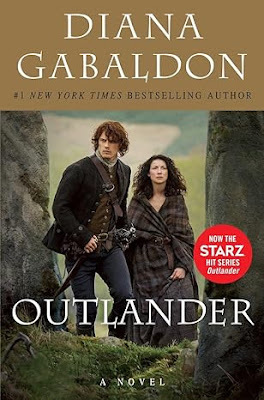
Outlander by Diana Gabaldon C
This is a long book. I had the ebook version of the boxed set of the first four books in the series, and I never seemed to make much headway reading it, no matter how long I read. A percentage point at a time. Thankfully, I only intended on reading the first book - which came out at a 1000 pages of 5000 pages of the box set, on my fire tablet. I even finished it with a few days to spare on my 14 day loan.
It is a portal fantasy/historical romance largely set in the highlands of Scotland in 1743-44. I did watch the first season of the TV show some years ago It did not impress me enough to continue on with it. Still, I thought that perhaps the book would be better. It was, until it wasn't.
Briefly, the story is set after the Second World War. Claire, our narrator and hero, was a nurse in that war and is now on a second honeymoon of sorts with her husband Frank, reunited after the war had separated them. Frank has a great something grandfather, "Black Jack" Randall, who was a British officer in the 1743 timeframe who was stationed in Scotland, and had an iffy reputation that Frank was researching. Frank and Claire observe a modern pagan ritual around a small stone ring, and when Claire returns to collect some plant specimens, she is drawn into its magical powers, and finds herself 200 years in the past, in 1743.
Right at the beginning she meets Frank's cruel distant relative, Captain Randall. Though he looks a lot like her Frank, she barely escapes being raped by him due to the appearance of some cattle raiding highlanders who save her. Her knowledge of treating wounds and illnesses serves her well as she treats some wounds while she's taken along with them, semi-accepted, semi-prisoner, vaguely suspected of being an English spy. Because she was raised by an archeologist who traveled the world, she was used to the often primitive conditions on sites and so was able to adopt to the primitive conditions she found herself in. Adventure and intrigues follow, with Claire eventually accepting an arranged marriage to make her a Scottish citizen, for reasons that in the end, really don't matter except to serve the romance plot.
The story is well written and told in first person by Claire, It is filled with well developed characters and well researched historical details. (Though, just to be a dick, I'll mention that in one scene she had her characters sitting on a "hay bale". An example of the occasional modern element some time creep into these types of storied. Recall that other book set in the 1920's where the characters looking at a hotel registry were looking a "screen". Details, details details. Not that it matters any.) I like how Gabaldon wrote Claire's backstory so she could realistically fit comfortably into the primitive 1743 setting.
As I guess romances do, it contains a lot of sex scenes with her 1743 husband, Jamie. I don't mind that, though my approach to first person narratives is that the narrator is telling their story to the reader, and well, relating detailed sex scenes would seem a little awkward to me, anyway. But then, this was likely written for women, and only they know what goes when they get to telling stories... I did find one thing that I thought strange, and that was, given all of Claire's candor about sex, she only mentioned her period once, and in passing. This is significant, in that she hoped to find a way to return to the stones in order to get back to Frank, her 1945 husband. That being the case, I would've thought that she'd be paying a great deal of attention to when she could safely make love to Jamie, so as not to return to 1945 pregnant. However, the possibility never seemed to cross her mind, at least for the first several months of her new marriage. While she and Frank had been trying to have a child, without success, as a nurse in 1945, she would likely know enough about getting pregnant that the failure to do so might not be her fault, and take precautions. But as I said, this was not the case. It just had me wondering... But maybe that's a romance convention. You don't get pregnant unless the plot demands it.
I was ready to give the story a grade of B when I came to this story's natural ending, and a perfect lead to the next book in the series. Unfortunately, this natural ending came half way into the book. Nearly everything that followed was unnecessary for plot and character development. Moreover, the pacing slowed so that the second half of the book really dragged for me. It was mostly spent killing time and almost killing poor Jamie.
I understand that a lot of stories put their characters through a great deal of pain and suffering, and maybe that's a trope in romance as well. But in any event, Gabaldon spent many, many pages describing the various cruelties, rape, and illnesses that Jamie had to endure. This was a theme throughout the book. For example, before the story takes place, Jamie had been flogged by Captain Randall nearly to death. This same incident is told in great detail by I believe three different people, including Jamie. The tedious second half of the book begins with a section featuring the domestic life on Jamie's estate, half of which is spent recounting the many times young Jamie had his rear end warmed by the belt of his father when he did something he shouldn't have. Why? And then, later, Jamie is held in prison where he is tortured, and raped by Randall, which once again is recounted in great detail, as well as all the painful things that Claire has to do to patch him up and nurse him back to health afterwards. Clearly all this detail has been included in the book to appeal to its potential readers, since it is unnecessary to advance the plot or build character. It has me wondering if all the blood and suffering is a romance trope as well as a grim dark fantasy trope. Is it romantic for the lass's lad to suffer for her, and for her to tend to his wounds? Maybe, given the popularity of this series. Once again I'm the odd man out.
So between the slow pacing - Claire spends several pages sneaking through a prison, and many pages describing her treatments of poor Jamie, the torture porn, and the overall extended spinning of wheels in the plot, the second half of this novel gets a D, from me, lowering the total novel a C grade.
As I said at the beginning, this probably wasn't written for me. It might be for you. I won't be continuing on with it.
January 17, 2024
I Love Bots

Bertieknew that Barkley needed only a hard reset to be restored to hisnormal, loving, playful self. But there his troubles began. He foundhimself situated without a paper clip and Barkley had, earlier in theevening in what, with hindsight, seems to have taken on a much lessmischievous cast, eaten his phone.
I love the bots, who or whatever they are, who occasionally flock to this blog in the hundreds for a day or two, usually from some obscure part of the world. I don't really know what's going on with them, or why they visit this site, but it is nice to look in to see that it has had hundreds of visitors every so often. Of course I know those numbers are completely meaningless. I can't imagine why they show up. But, well, they're my best customers.
In the last 8 plus years this site has had some 85,000 visitors. The vast, vast, majority of these visitors have been these bots, hackers, or whatever. These days, I might get two or three authentic visitors in a day, and occasionally maybe a dozen. I want to be clear; I'm just fine with that. I make no effort to attract viewers, rarely adding tags that search engines can use to direct traffic to this site. I'm not really blogging to attract readers. I'm blogging these days just to write things. Things like this fluff piece on bots, simply because I love to write. Go figure.
I began this blog when I first started publishing my own books, almost nine years ago. At the time, it was common wisdom that authors needed a website and/or a blog to promote their books. Web sites cost money, and I really don't see any purpose in paying for a website, so I went with this free, simple blog in order to communicate with any of my readers who might look in. Because I hate maps in ebooks, finding them annoying, and usually useless as they are too small, I posted the maps to my books on this site, to make it somewhat useful, with a link to the maps and info in my ebooks on this site. Or at least a mention of my blog, since links may have been beyond me at the time.
Blogs, however, are out of fashion these days - and so are websites it seems, since just about every author website I've ever looked in on hasn't been updated in years. These days, all the cool kid authors communicate with their fans on short form social media; Like X, ex-Twitter, Facebook, Tic Tok or Instagram, none of which I use. For me, it's this blog or nothing.
However, the lack of a large readership means that not only can I post whatever I (desperately) come up with to write each week, (like this post) but I can also post honest book reviews, safe in the knowledge that they'll make no difference. Making no difference is not exactly a lofty goal, but as I said, I love to write, and I must confess I like being a critic as well, so this blog gives me not only the chance to write things a inconsequential as this post, but the chance to say what I think about books, without having to bite my tongue and be nice. And it keeps me writing.
Speaking of writing, I'm hoping to be in a position to post an update to my long form writing next week. Stay tuned.
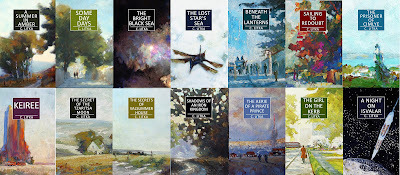
January 13, 2024
The Saturday Morning Post (No. 30)

This Saturday I have several mystery stories to talk about. They are, I believe, rereads. At least some of them. However if I read any of these three books, and I think I must have, I read them about 30 years ago and remembered nothing of their stories. All I recall is that I enjoyed them. So without further ado...
My reviewer criteria. I like light, entertaining novels. I like smaller scale stories rather than epics. I like character focused novels featuring pleasant characters, with a minimum number of unpleasant ones. I greatly value clever and witty writing. I like first person, or close third person narratives. I dislike a lot of "head jumping" between POVs and flashbacks. I want a story, not a puzzle. While I am not opposed to violence, I dislike gore for the sake of gore. I find long and elaborate fight, action, and battle sequences tedious. Plot holes and things that happen for the convenience of the author annoy me. And I fear I'm a born critic in that I don't mind pointing out what I don't like in a story. However, I lay no claim to be the final arbitrator of style and taste, you need to decide for yourself what you like or dislike in a book.
Your opinions are always welcome. Comment below.
These Books are a 2023 Read
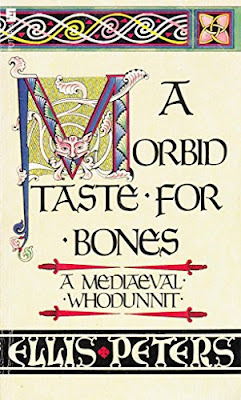
A Morbid Taste for Bones by Ellis Peters A
This book was available as a library ebook, and by pure chance, it was the first of the two of the two I had placed a hold onto show up. That was a bit of luck, since it happens to be the first book in the Cadfael Chronicles. Thus, I began my reread at the beginning. The Cadfael Chronicles is a long series of historical murder mysteries set in the 12th century; twenty books in all, written between 1977 to 1994 by the linguist-scholar Edith Pargeter. Her writting career stretched from the late 1930's to the early 1990's totaling some 80 books in all; both fiction and non-fiction, plus many short stories under a series of different pen names. I first read these stories from the library sometime in the 1990's. I don't recall how many I read, only that I enjoyed every one of them. The other similar series by Margaret Frazer's (and Mary Monica Pulver Kuhfeld) which featured Dame Frevisse, a 15th century Benedictine nun, I read and enjoyed as well. The thing about history is that if it is knowledgably and colorfully invoked, it can be as strange and wonderful as any imaginary world. As I have mentioned, I'm not much of a lad for murder mysteries - but when they are skillfully set in a strange and well realized historical period with appealing characters, and I'm all in.
Anyway, back to the book at hand. The "detective" in these mysteries is Cadfael, a Welsh Benedictine monk of the 12th century. The stories are set in and around English city of Shrewsbury on the borders of Wales. Unlike many of his brother monks, Cadfael had seen much of the world - having gone on a Crusade, as a soldier and a sailor, and during that period had a series of lovers - before he returned home to "retire" to the monastery. Thus he is well equipped to decipher and deal with matters that most cloistered monks would be out of their depths dealing with. In this case, it is the murder of a minor Welsh nobleman who opposed the plan of the monks of the Shrewsbury Abbey to dig up the bones of a local saint and transport them back to the abbey in England. In those days, holy relics of all sorts were used to entice the pilgrim/tourists to visit churches and monasteries bring gifts that increased the wealth of church or monastery. So the prior if the Shrewsbury Abbey was looking around for a saint to add to the Abbey's attractions. A somewhat suspect vision of one of the monks lead the monks to a remote locale in Wales to dig up the bones of a rather neglected saint. The natives, however oppose this plan to remove their saint, and when the leading figure opposing them is murdered, Cadfael sets out to find out who did it, especially since he feels that the prime suspect had been framed. Enough said.
The story is very well written. The scene well set, the key characters vivid, if the minor ones are mostly mostly just names, they are there to dress the set or act as suspects. I've graded this book as an A. Books get an A grade when I can find a book both entertaining without finding anything to complain about. As any regular reader of these posts knows, it is not hard for me to find things to complain about. I both really enjoyed this book, and could find nothing to complain about, so they earned their A.
I highly recommend this series. It is, however, a series that is best read in order, since it is set chronologically in the years 1137 to 1145 and the stories deal with the turbulent historical events of that time, a time when King Stephen and Empress Matilda (aka Empress Maud) were fighting over the crown of England. I seem to recall that while Cadfael is a minor monk in this story, his fame grows throughout the series, and he plays parts in the historical drama raging in England at this time.
I should also add that there was a TV series of 13 episodes made from these books, each one based somewhat loosely on one of the books which were aired as a PBS Mystery! series. I don't believe I've seen them, so I can't speak to their quality.
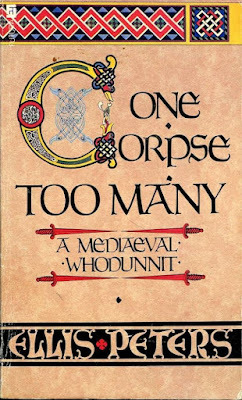
One Corpse Too Many by Ellis Peters A
After reading the first volume, I decided to read the first three books in the series, so I ordered a paper copy of this title from the library as I was waiting on the ebook version of the third book to become available.
This story is set a year latter than the first one, during one of England's civil wars when the cousins, King Stephen and Empress Maud contended for the throne of England. The army of King Stephen has arrived in Shrewsbury and is besieging the castle, held by followers of Maud. In the ever shifting political landscape, King Stephen is told that his leniency in past actions looks like weakness and he is urged to set an grim example by hanging all the surviving defenders of the Castle after it is taken. This he does, hanging 94 of them. The monks of the abbey take it upon themselves to bury the dead, with Cadfael - the old crusader - in charge, but he finds that there are 95 bodies under the gallows the next morning. An extra body - a body that wasn't hung, but strangled, i.e. someone who was murdered and then thrown in with the rest to cover the deed. Cadfael, and the King want to see the murder brought to justice, so Cadfael investigates... But he has other concerns as well..
Prior to that Cadfael is given charge of a young person to help in with his garden and medical herb work; a person who has been placed in the abbey to escape capture. A person with a secret who is someone who has a clever man looking for them on the order of the King to hold them for ransom. In short, someone who needs to be protected.
What can I say? Once again we have a book with many engaging characters, a mystery, and a sense of history, without, as far as I can see, a flaw to remark upon. In short, an A book, once again.
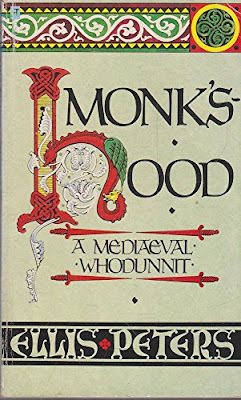
Monk's Hood by Ellis Peters B+
I rated this book slightly less then the first two books only because it was a bit more of a conventional whodunnit than the first two, though once again the characters were superbly and vividly drawn, and the setting evocative of another place and time.
This time around a guest of the Abbey has been poisoned and an innocent stepson suspected of his murder. The poison came from Brother Cadfael's supply of monk's hood which was used to ease pain by rubbing into the skin, but if ingested, kills. Cadfael must discover the true murder to save the son of the girl he loved in his long ago youth.
After reading these first three books, I decided that I want to keep on reading these stories. I'm sure that I haven't read all 16 of them, but even if I have, I don't remember any of them. And rather than rely on the library for every book in order, I went on Abe Books and ordered all of the Cadfael stories in seven omnibus editions, and thus, I can promise you that you'll be seeing more Cadfael reviews over the course of 2024.
January 10, 2024
A New Omnibus
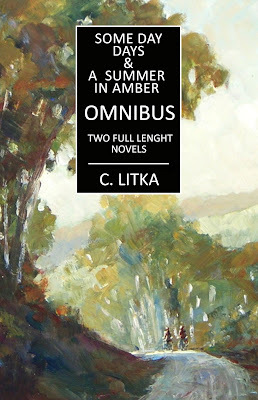
Over the weekend I released an new omnibus version of two of my novels, Some Day Days and A Summer in Amber for $.99 on Amazon. They are exclusive to Amazon. I had originally intended to release this omnibus this past summer, but the first two such omnibus versions sold only a handful of copies, so I was undecided as to whether to continue the effort or not. But now, I've decided that I have nothing to lose by doing so, so I have. I will probably release a After the Solar Age Omnibus, which included Keiree, Beneath the Lanterns, and The Girl on the Kerb, sometime this summer. And a final one, Tales of the Tropic Sea Omnibus around this time, next year.
The point of these omnibus versions is to make it a painless as possible for Amazon customers outside of the US to purchase and read my books. Only two or three of my books are not free on Amazon.com, but usually only one, if any at all, are free on non-US Amazon sites. I could, of course, reduce the list price of all my books to $.99 - I have done so in the past - but I want to keep the retail price listed at the usual indie publisher's price, just to give a sense of value. I don't know it it makes a difference or not. But that's what I settled on.
What this experiment illustrates, however, is something we all know; readers are unlikely to find your books without advertising. Between the two current omnibus versions I've sold 13 copies in like 7 or 8 months. I don't think that's going to change, but since it only takes an hour or two of work on my part to publish them, so why not?
The more important lesson to be learned by this experiment is the value of owning your own work. You, as the owner, can try different ways to sell and/or monetize your work. A traditional publisher will print only as many copies as they think will sell, and unless they sell faster than anticipated, they will leave it at that. Oh, they'll keep an ebook and audiobook version alive, so that the retain the rights the purchased, but that's it. As the publisher of your own books, you can renew, rework and promote your entire catalog. You can put on new covers, try new prices, make boxed sets, and see what works. You don't have to give up on yourself.
January 6, 2024
The Saturday Morning Post (No. 29)

Seeing that I was waiting on some books from the library, and feeling like reading something new, I opened up the library website and pondered, what to search for. Since it had been a little while since I read one of those Furrowed Middlebrow books, so I searched for D E Stevenson, and lo! I found two of her books as ebooks, one I knew I hadn't read, and one, well if I did, it was likely 25 or more years ago. Both were available, so I picked both of them up. My thoughts below.
Just a note; I likely read these books back in November of 2023, as it looks like I'm about 5 weeks behind in my reviews, since I have No. 35 written already. I like the breathing room that give me, so expect more 2023 reads for the next month or so.
My reviewer criteria. I like light, entertaining novels. I like smaller scale stories rather than epics. I like character focused novels featuring pleasant characters, with a minimum number of unpleasant ones. I greatly value clever and witty writing. I like first person, or close third person narratives. I dislike a lot of "head jumping" between POVs and flashbacks. I want a story, not a puzzle. While I am not opposed to violence, I dislike gore for the sake of gore. I find long and elaborate fight, action, and battle sequences tedious. Plot holes and things that happen for the convenience of the author annoy me. And I fear I'm a born critic in that I don't mind pointing out what I don't like in a story. However, I lay no claim to be the final arbitrator of style and taste, you need to decide for yourself what you like or dislike in a book.
Your opinions are always welcome. Comment below.
Note: A 2023 Read
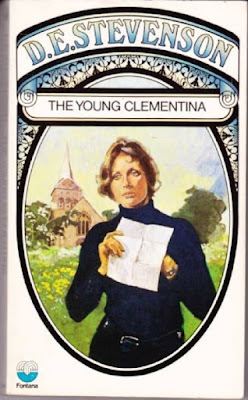
The Young Clementina by D E Stevenson C+
Stevenson used an interesting approach to this story. In the beginning it is written as a long letter by the narrator, Charlette, filling in her backstory, so as to clear her mind and come to a decision on what to do with her life. She is writing this letter to an imaginary friend, someone she met briefly on a bus, had a few words with her, but always remembered her. Otherwise friendless, she sets out her dilemma in this long letter that will never be sent. It seems that she has come to as crossroads in her life, and must choose. On one hand, she has settled into a lonely, but familiar rut working in a bookshop in London. On the other hand, she has an offer to take up something new and challenging that involves not only doing something she doesn't know how to do; raise a child, but by doing so she risks opening an old and still painful heartbreak.
Some time after setting out her back story, the narrator returns to present to write a long letter this imaginary friend telling her about the ramifications of her decision.
I really hate spoilers, so there is not much more I can say, except, as you would no doubt guess, she leaves her lonely but comfortable rut and takes on the new challenge, facing the old heartbreak she had endured.
One aspect that I find interesting about these books is their class/caste attitude. I think it must reflect either that of Mrs Stevenson's or what she thinks her readers expect. In this case, the narrator, Charlette works 9:30 to 6PM in a bookshop, I suppose 5 1/2 days a week - as one did in Britain at this time, Saturday was usually a half day of work. She can't be making a great deal of money, lives in a small one bedroom flat, and yet she still employs a woman for several, hours a day to do housework and cook supper for her. The idea of any of Stevenson's heroines keeping house or cooking themselves is well beyond the pale. Nice women, even in reduced means, still employ servants to do that sort of work.
I enjoyed the book, though I have to admit that I didn't like the ending. It was too overwrought. Plus, I predicted the end as soon as I read the circumstances of one pivotal event. Quite frankly, Molly Chavering would have had the courage to do the ending right, in my opinion. Oh well, a C+ book instead of a B one.
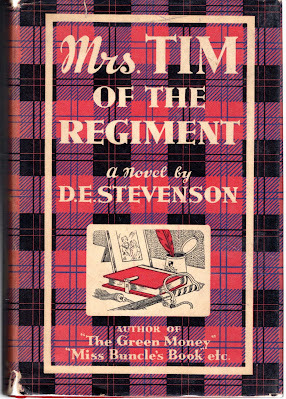
Mrs. Tim of the Regiment by D E Stevenson AD E Stevenson writes in the forward of this book that a friend of hers, whose daughter was going to marry an officer in a Highland Regiment, wanted to know what the daughter's life would be like, ca. 1930's. Since Mrs Stevenson was married to an British Army officer, she offered to let them read her diary to get an idea of the life. When they returned it, they said that everyone had found it so funny and that she could make it into a very amusing book. "It just needs to be expanded, and you could pep it up a little, couldn't you?" Stevenson, doubtful at first, decided to give it a try, and so she wrote Leaves From the Diary of an Officer's Wife. However, she got so carried away her fictional narrator, Hester, i.e. Mrs Tim, that she wrote a second story about her holiday in the Scottish Highlands that she called Golden Days. However both books were published in an omnibus version, and these days both books are published together as Mrs Tim of the Regiment.
The entire book is written in the form of diary entries. In the first part of the novel, the Leaves From... part, features relatively brief vignettes of the various characters in her life, as a military wife. I find all the little details of daily life in the 1930's England very interesting. Here again we have what I suppose is an upper-middle class family of a British officer, one who is certainly not wealthy, and they employ a staff of 3 to look after their rented house; a cook, a maid, and a nanny to look after their two children. Their son is sent off to a boarding school at the age of 11. And they apparently think that he is perfectly capable of traveling from a small town south of London to Scotland (Glasgow I think) via trains all by himself for his school holiday. Times sure have changed.
The story becomes more than an account of everyday life in the second Golden Days half of the book. Hester is invited to spend a fortnight in the Highlands with a friend she made after Captain Tim was transferred to Scotland in the first half of the book. I love stories set in Scotland, and this one is as charming as any, with a cast of interesting characters, situations, and a subtle romance at its core. I'm a sucker for romance, handled as elegantly as Stevenson did in this story.
D E Stevenson can be a mixed bag, none really bad, at least so far, but sometimes I find them to be somewhat "cold." This one, however, was a winner for me on the strength of the Golden Days of a holiday in Scotland in the half of the book.
January 3, 2024
End of Year Report
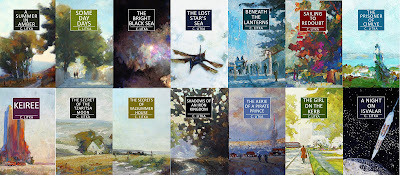
First off, as I related in my last blog post, I dropped all my books from Smashwords except for Smashwords itself on Friday. On Monday, the 1st, I republished them on Draft2 Digital to all of D2D's outlets. In addition, I created audiobooks for Apple and Everand, which is formerly Scribd. The ebooks should mostly be now available, but the audiobooks can take up to 2 months to process. The big downside of this move is that it appears that I lost all my ratings on Apple and Kobo by changing publishers. We'll see if they reappear at some point, but if not, oh well. Time will tell if ratings make any difference - sales on all but Apple were so minor it wouldn't matter in any case.
Creating audiobooks via D2D for Apple was easy. Too easy. Too easy because you really have only two options to choose from; do you want a female or male narrator and in what genre do you want to list your books. And that's it. There are no other options. Unlike Google, the process can take months, I guess, and I don't know if I will be able to review and approve of the audiobook before it is published. Since my stories have made-up words, I have some concerns as to how the AI will process them, but I'll just have to wait and see. If I don't get to review and correct pronunciation on the audio version, like I do with Google, all I can do is hope for the best. Again, oh well.
As for the end of the year report; it was a good year.
Since I was doing my end of the month bookkeeping, as well as my end of the year numbers, I might as well share them with you. I'm happy to say that 2023 was my best year ever, as a publisher. Just remember that getting my books into the hands of readers is my criteria of success, not revenue. For that reason I sell my books at my cost, i.e. free.
In 2023 I sold 18,928 books of which 6,376 were audiobooks
In 2022 I sold 13,779 books of which 5,813 were audiobooks (8 moths of audio books)
In 2021 I sold 8,699 books
In 2020 I sold 6,490 books
In 2019 I sold 8,598 books
In 2018 I sold 6,999 books
In 2017 I sold 6,340 books
In 2016 I sold 6,510 books
In 2015 I sold 4,932 books (8 months only)
If I did my math right, 33.7% of my book sales came from audiobooks in 2023. As for ebooks, I sold 12,552 of them, which was significantly more than 2022's 7,966. However, the reason for this was clearly the unexpected success of The Girl on the Kerb. That book alone sold 5,371 ebook copies in 2023, mostly on Amazon, or 40% of my total ebook sales. Without it in the mix, I sold only 7,489 copies of all my other ebooks combined. If you compared this total to the 7,966 ebooks I sold in 2022 you'll see that my ebook sales would be slightly down. Without the success of The Girl on the Kerb, and the continued success of Google audiobooks, my publishing business would have been declining since 2021, and in the big picture, basically flat since I began it, even though I've added books to my catalog every year. It pays to innovate.
Unless my Apple audiobooks do a lot better than I expect, I don't think 2024 will come close to 2023 in terms of sales. Book sales always decline over time.
I would like to add that numbers are just numbers. While they are nice to look at, they're just a game to me, as in what can I do to increase them, without spending any effort, time, or money? What do I get from writing is my joy of creating something that is mine by painting with words to craft stories. In addition, I enjoy receiving and responding to emails from readers, and interacting, even in a limited and remote way with my beta readers and fellow authors. For that reason, I always enjoy hearing from all of you, and make a point of responding whether it be emails or comments on this blog.
2023 was a rather fallow year for creative endeavors, I'm hoping that respite will pay off in 2024. Stay turned for a writing update in early February on that front.
And let me close with wishing all of you a Happy New Year. I hope your 2024 is your best year ever!
December 30, 2023
The Saturday Morning Post (No. 28) The 2023 Reading Wrap-up

With the end of 2023, the time has rolled around again to look back on the books I've read this past year.
My reviewer criteria. I like light, entertaining novels. I like smaller scale stories rather than epics. I like character focused novels featuring pleasant characters, with a minimum number of unpleasant ones. I greatly value clever and witty writing. I like first person, or close third person narratives. I dislike a lot of "head jumping" between POVs and flashbacks. I want a story, not a puzzle. While I am not opposed to violence, I dislike gore for the sake of gore. I find long and elaborate fight, action, and battle sequences tedious. Plot holes and things that happen for the convenience of the author annoy me. And I fear I'm a born critic in that I don't mind pointing out what I don't like in a story. However, I lay no claim to be the final arbitrator of style and taste, you need to decide for yourself what you like or dislike in a book.
Your opinions are always welcome. Comment below.
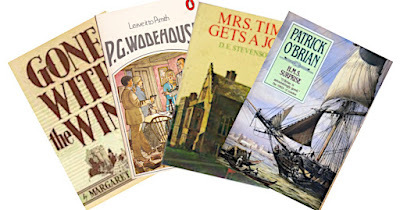
This year I started 108 books, finished 93, with 15 DNF books. I have never read more books in a year than in 2023.
In 2022 I started 40 books, finished 25 of them, again, with 15 DNF books. I have to go back into the ancient past, soon after the dinosaurs died off, to find my second best year for reading. That was the year 1966, when I read 100 books, all of them science fiction. The following year I recorded reading 57 SF books, and the only other record I have of books read runs from Feb. 1970 to April 1971. In it I recorded 77 books, which now include more than SF books. There were many years when I may have read only a dozen, or less, especially in the years when I was writing my own books.
So why did I read so many books this year? I think that I can list several reasons.
The first is that I am a fairly fast reader. Not a speed reader, but I can read most books within two or three days. We're looking at 2 books a week for 2023, so I'm not exactly reading at a breakneck pace.
The second reason was that I was not writing for most of the year. I did some revisions on The Girl on the Kerb at the beginning of the year, and I only returned to writing, an hour a day, in October, so that I had the time, and more importantly, the mental bandwidth to read. In the past, I did not like to read books when I had my story in mind and was trying to write it down. One story in my head was enough. So the lack of serious writing left a space in my life that could be filled with reading.
A third factor was that about a year and a half ago, I realized that science fiction wasn't my bag anymore, and probably hadn't been for some time. As a result, I went on a quest to find new genres to read. At first I tried free books from Amazon in a coupe of different genres, with so-so results. But they broke the iron hold SF had on me. I've moved on in two directions. I'm now giving books and authors a try based on recommendations by people in blogs and on the BookTube channels. In addition, I've been rereading some of my favorite books from my selves, many of them for the first time in decades.
And finally, I've been reviewing at least one book every week for this blog. That puts a certain pressure on me to keep reading. The good news on that front, for me, at least, is that I think I have 15 books that I read this year that I have yet to post reviews for. I've got some breathing room. I don't mind falling behind.
I don't know how many books I'll end up reading in 2024. I don't look on it as a contest. I have no goals. We'll see what develops. but honestly, I would be surprised if I got around to reading 92 books in 2024. There are only so many good books.
In any event, below are a list of my best reads for 2023; books that earned an A grade from me, in no particular order. I find it impossible to rank books. The links to the reviews may include other books as well. The (RR) indicates a reread, and the "?" in the case of the Ellis Peters books because I'm not sure what titles from the library I read 30 years ago.
The Killer Angels by Michael Shaara A- My review
Mister Roberts by Thomas Heggen A- (RR) My review
The Razor’s Edge by W Somerset Maugham A My review
The High Window by Raymond Chandler A (RR) My review
The Big Sleep by Raymond Chandler A (RR) My review (a very short one)
Flashman and the Mountain of Light by George MacDonald Fraser A+ (RR)
H. M. S. Surprise by Patrick O’Brian A+ (RR) My review includes Flashman
Apricot Sky by Ruby Ferguson A My review
Boy in the Blitz by Colin Perry A (RR) My review
Gone With the Wind by Margaret Mitchell A-/B+ My review
IN GOD WE TRUST All Others Pay Cash by Jean Shepherd A (RR) My review
Mrs. Tim of the Regiment by D E Stevenson A Stay tuned, review coming
A Morbid Taste for Bones by Ellis Peters A (RR??) Stay tuned, review coming
One Corpse Too Many by Ellis Peters A (RR) Stay tuned, review coming
Lessons in Chemistry by Bonni Garmus A Stay Tuned, review coming
Saint Peter's Fair by Ellis Peters A (RR?) Stay Tuned, review coming
While my A list includes a lot of rereads, I think that can be simply explained by the fact that the only books I'm going to bother rereading are my favorites. Most of them I haven't read in 10 to 30 plus years, so they were often as fresh as my first (or second) reading.
As for the books that didn't quite make an A; I find that I have read;
31 B books, i.e. books I really liked, many of them just falling short of an A
46 C books, average books. I DNF books that I don't like, so they're good but not great books for me.
1 D book, that I kept reading hoping for the best, but it kept getting worse.
15 DNFed books that I sampled but did not suit my tastes.
Sneak Preview of 2024 reads:
I found those Ellis Peters' Brother Cadfael books so enjoyable that I went online to Abe books and ordered all 16 Cadfael mysteries in the 3 book omnibuses version, so you can expect to be seeing reviews of those mysteries scattered throughout the year.
There is of course, the big one; Jasper Fforde's Red Side Story the book that I've been waiting for a decade plus to read.
And... Well, I can't say I can see further into the future than anyone else, so I don't know what else will tickle my fancy. Probably some more rereads from my shelves. Stay tuned.
How was your 2023 in reading?
 My storehouse of good books
My storehouse of good booksDecember 27, 2023
Under The Hood Changes
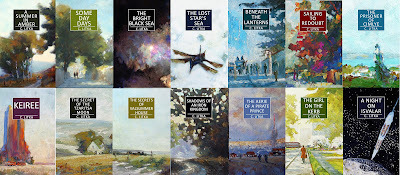
During the next week or two I'll be making some under the hood changes in my publishing arrangements. These changes are sparked by my discovery that Apple is now offering to convert ebooks into auto-narrated audiobooks, for free. My experience with these auto-generated audiobooks on Google has been entirely positive. Indeed, more than 1/3 of my book sales now come from audiobooks and their ratings match the ebook versions. So why not?
At the beginning of my publishing venture, I used two venders; Smashwords which also distributes my books to Apple, B & N, and Kobo, and Amazon. Some five years ago I added Google to my list. And when Draft2Digital bought out Smashwords, I added Draft2Digital, mostly as place holder against whatever developed with that purchase. At the present, I only offer my books via D2D in the two European ebook stores D2D serves. However, when I discovered that Apple was offering to convert ebooks to audiobooks, I decided that I needed to make some changes.
I always thought that, Apple being Apple, I would need to own a Mac computer and use their word processor program Pages, to publish directly to the Apple store, and since I could sell there via Smashwords, I never gave it another thought. Until now. With the lure of audiobooks on Apple, I investigated what I needed to do. Did I really need to own a Mac to list my books directly with Apple? As it turns out, no. You can upload ePUB files directly to the Apple store, which is what I do for Google. Suddenly, my prospects looked bright. I went and created new generic ePUB versions of my books as my Google versions had "Google Version" on the copyright page. However, when I looked into audio books further, I discovered that these conversions are done through some trusted partners... Long story short, do your research thoroughly.
Luckily, Draft2Digital was the prime trusted partner. I will need to look into it further, but I believe all I will have to do is to list my Apple editions through D2D to be able to take advantage of the audiobook feature.
As eager as I am to do this, I suppose that I need to take a breath, and do things step-by-step. The first step will be to pull all my books from every Smashwords vender save Smashwords itself. I will do that this Friday. Then I will relist them to every outlet D2D distributes to on Monday just to give the vendors time to drop the Smashwords editions before adding the 2D2 versions. I don't know if this is necessary - Apple now lists D2D as my publisher in the book data, but just to be on the safe side, I'll give them some time to avoid any confusion. Hopefully, once I have my books on Apple with D2D, I can get them converted. I'll keep you informed.
I don't know what to expect from Apple audiobooks. They only offer 3 male and 3 female narrator voices, compared to Google's a dozen plus each, and one of those is a very serious voice for non-fiction. They have one voice for fiction & romance, and one for SF and fantasy. I like the fiction and romance voice slightly better, but I much prefer my choice with Google. But beggars can't be chooser. As for sales, who knows? Google dwarfs my ebook sales on Apple, but, on the other hand, Apple iPhones have 50% of the US market, and a lot of people read books and audiobooks on their phones or in the car on their commutes via their phones. Apple customers tend to be more well heeled than Android customers, so the free price of my audiobooks may not be all that big a draw on Apple. Still, who knows? I intend to find out.
However, nothing is a done deal at the moment. I'll update you next week on how things are going. If all goes well, you'll soon be able to listen to my stories on your iPhone or iPad. Stay turned.
December 23, 2023
The Saturday Morning Post (No. 27)

This time around we have a book that you are almost certainly know part of, but likely have never read. Parts of the book were adopted into a movie that became a seasonal favorite. Indeed, I can remember a time when the movie ran on TV back to back for 24 hours on Christmas eve & day. However, it was chopped up into 5 minute sections to fit in all the commercials, making it nearly impossible to enjoy. The book it it is base on is a lot more obscure, but shouldn't be since it is a masterpiece of humor. Let's get to it...
My reviewer criteria. I like light, entertaining novels. I like smaller scale stories rather than epics. I like character focused novels featuring pleasant characters, with a minimum number of unpleasant ones. I greatly value clever and witty writing. I like first person, or close third person narratives. I dislike a lot of "head jumping" between POVs and flashbacks. I want a story, not a puzzle. While I am not opposed to violence, I dislike gore for the sake of gore. I find long and elaborate fight, action, and battle sequences tedious. Plot holes and things that happen for the convenience of the author annoy me. And I fear I'm a born critic in that I don't mind pointing out what I don't like in a story. However, I lay no claim to be the final arbitrator of style and taste, you need to decide for yourself what you like or dislike in a book.
Your opinions are always welcome. Comment below.
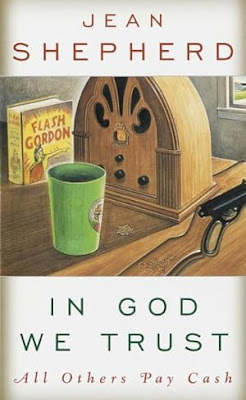
IN GOD WE TRUST, All Others Pay Cash by Jean Shepherd AThe movie is 1983's A Christmas Story and the book it draws its story from this book. The book is a semi-fictional account of Jean Shepherd's youth and teen years growing up in depression era Hohman Indiana. Jean Shepherd was late night radio DJ, writer, and screenwriter. Many of stories in this book, and his other three similar books, were written to read on his late night radio show in New York city. The premise of this book is the semi-fictional Ralphie, now grown up and living in New York city, returns to Hohman to write for a magazine, "The Return Of The Native To The Indiana Mill Town". His first stop upon arrival is the bar of his old friend Flick's dad, which Flick now runs. They get to reminiscing which gives the reader a series of several dozen short tales about growing up in Hohman in the 1930's, interspersed with a few interludes of "Ralph's" present day life.
Shepherd co-wrote the screen play for the movie A Christmas Story, and did the voice over narration for it. The movie weaves various episodes from the book into its Christmas setting. The main Christmas story in the book concerns the Official Red Ryder Range Model Air Rifle that Ralphie wants for Christmas. Other episodes are adopted from different time periods which are folded into the movie as well, such as the fight with the bully, and the "major prize" his father wins from that orange soda company.
The book vividly evokes life in the grim and grimy steel mill and oil refinery city of Hohman, just to the east of Chicago where "the natives had been idle so long that they no longer even considered themselves out of work. Work had ceased to exist, so how could you be out of it?" He tells his stories with a great deal of humor and exaggeration, which nevertheless recreates a very real time and place in America.
The movie was set in 1940, and I was born ten years later and grew up in Milwaukee, a hour or so north of Chicago, so neither the book or movie exactly describes my life. Any yet, in 1950's were close enough to the '20's & 40's in some ways, that his description of life resonates with me, and adds to the humor and charm of this book. I wonder if how younger readers would find this book?
Humor is a tricky thing. Something one person finds hilarious, another just shake their head. So it is hard to say if you would find this book as funny as I do. I will leave it up to you by ending this review with two small section, selected more or less at random form a longer story that describes a night Ralphie spent fishing with his dad on northern Indiana lake.
"Naturally, fishing is different in Indiana. The muddy lakes, aboutMay, when the sun starts beating down on them, would begin to simmerand bubble quietly around the edges. These lakes are not fed bysprings or streams. I don’t know what feeds them. Maybe seepage.Nothing but weeds and truck axles, on the bottoms; flat, low, muddybanks, surrounded by cottonwood trees, cattails, smelly marshes andold dumps. Archetypal dumps. Dumps gravitate to Indiana lakes likeflies to a hog killing. Way down at the end where the water isshallow and soupy are the old cars and the ashes, bustedrefrigerators, oil drums, old corsets, and God knows what else.
At the other end ofthe lake is the Roller Rink. There’s always a Roller Rink. You canhear that old electric organ going, playing “Heartaches,” and youcan hear the sound of the roller skates;
Shhhhhh...sssshhhhhhh….ssssssshhhhhhhhhhhh…."
As for fishing;
"Crappies are a special breed of Midwestern fish, create by God for the express purpose of surviving in waters that would kill a bubonic-plague bacillus. They have never been know to fight, or even faintly struggle. I guess when're a crappie, you figure it's no use anyway. One thing is as bad as the another. They're just down there in the soup. No one quite knows what they eat, if anything, but everyone is fishing for them. At two in the morning.
Eachboat contains a minimum of nine guys and fourteen cases of beer. Andonce in a while, in the darkness, is heard the sound of a buy fallingover backward into the slime: SSSSGKUNK
"Oh!Ah! Help, help! A piteous cry in the darkness. Another voice;
"Hey,for God's sake, Charlie's fallen in again! Grab the oar!"
Andthen it slowly dies down. Charlie is hauled out of the goo and islying on the bottom of the boat, urping up dead lizards and AtlasPrager. Peace reigns again."
Scenes from the movie A Christmas Story;


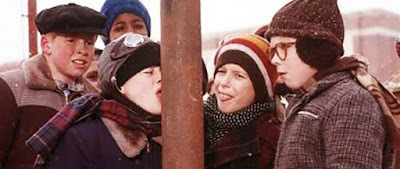
December 20, 2023
Winter in Cealanda

For the last 30 some years I've traveled the highways and byways of the imaginary land of Cealanda, stopping where I will to paint scenes that I found interesting. It seems that I like to travel just as long as long as I can do it in my imagination and not actually have to go anywhere. While I have done a bit of traveling in my life, including a "Grand Tour" after college; 2 1/2 months traveling around Britain via British Rail on my own, I don't travel anymore, except form my virtual rides on trains and busses via YouTube and in my imagination. Plus, I do a lot imaginary traveling these days for my stories, just as I did it for my paintings.
Seeing that today we're at or near the winter solstice, the most "wintery" time of year, even though we have like 4 months of winter following the solstice around these parts, I figured I'd post a few of my paintings of winter in Cealanda. They can also serve as my Christmas cards to you, dear readers.
The watercolor painting above is of an alley in Pangone, an district of Willowsea a city, which I frequently. The stables have mostly been converted to dwellings and workshops. Below is a view of an enclosed court in Willowsea.
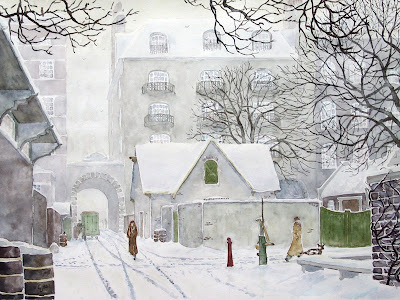
Watercolor winter scenes worked for me because the white of the snow separates colors so that they don't bleed together. It keeps the paintings crisp as you can see in the painting below. If all the snow was grass, things would tend to bleed together, at least for me.

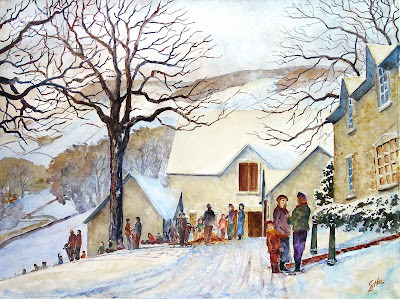
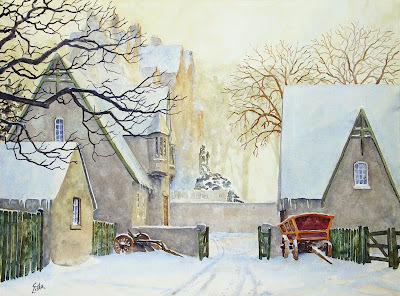
Above are two rural scenes, the lower one I know to be painted with acrylic paint on watercolor canvas. The upper one maybe. Otherwise it is watercolor on paper.
A bit of background. At the age of 53 I quite my day job to be come a full time starving artist. I was quite successful at the starving part. One thing I quickly learned was that oil paintings commanded a whole lot more money than watercolors. So if I was not to starve, I needed to teach myself how to paint in oils. Given time constrains - I didn't have 20 years to learn how to paint in oil - as well as personal preference, I adopted the impressionist style of painting and made it my own. After a year or two, I switched to painting with acrylics on hardboard because oils took so long to dry, painting them on stretched canvas made shipping them to customers somewhat iffy, moreover, I found that I could do almost every thing that I wanted in acrylic paints and do it easier than in oils. Below are several samples of my paintings (thick) acrylic impressionist paintings.
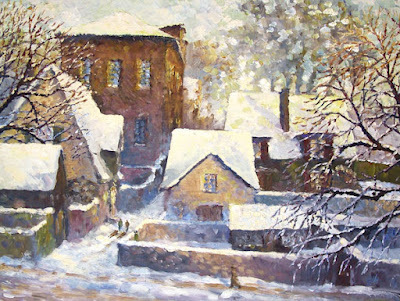
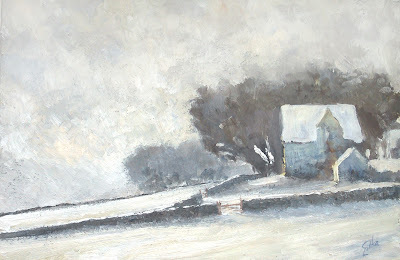
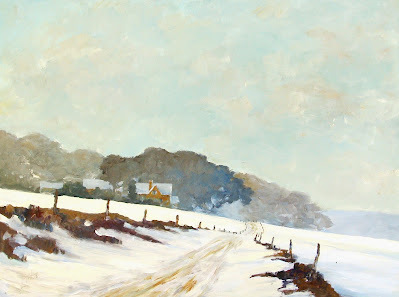
I could go on and on, as I have painted probably 2000 paintings. I have a link to my on line galleries on the right, if you care to see more of my work in paint. My wife likes my watercolor style paintings, though the later ones in that style were actually painted using acrylic paint on watercolor canvas, but I like my thicker, impressionist style paintings better. And I know best.
In any and all events, Happy Holiday season whatever holiday you celebrate, or just survive, like me.
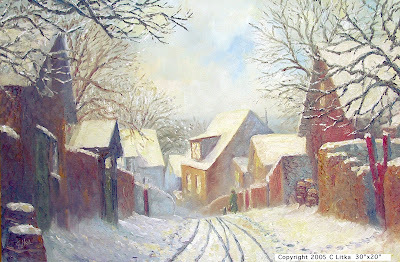
Above an oil painting, on stretched canvas below a watercolor on paper




